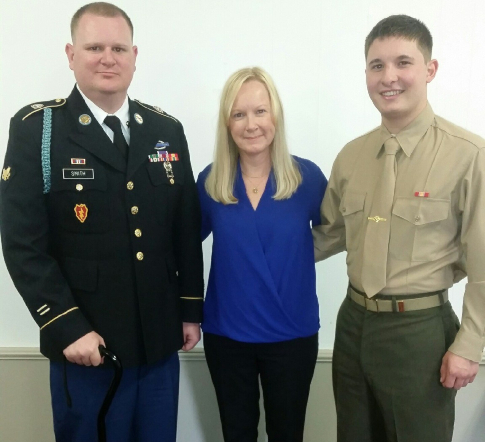4 Ways Military Caregivers Can Avoid Compassion Fatigue

Jennifer Smith Mackinday’s life changed the day her brother James was wounded by an improvised explosive device while serving as an Army infantryman in Mosul, Iraq. During the 15 years since that fateful day, Jennifer and her brother have journeyed together on a bumpy road most siblings don’t traverse.
The journey has taught Jennifer many lessons. One of the most poignant lessons is to care for herself in the face of long days and nights as a caregiver. She learned that lesson the hard way, after feeling what she describes now as “compassion fatigue.”
At one point, she felt herself slipping down. She caught herself and found help through Wounded Warrior Project® (WWP), Elizabeth Dole Foundation, and other organizations that support military caregivers.
“What caregivers experience is more than burnout — it’s a chronic, long-term condition that can overwhelm someone caring for a loved one,” Jennifer said.
Her brother James depended on Jennifer even before he was hurt serving our country in Iraq. While working full-time and raising her son Grant, who is now 24 and a Marine Corps veteran, Jennifer stepped up to be James’ guardian during his teenage years, raising him through high school.
When James suffered combat wounds, including traumatic brain injury, Jennifer stepped in again, this time as his full-time caregiver, giving up her career and devoting herself to his care and advocacy.
She didn’t hesitate to take on the role, but there was no road map, no recognition, and little support and resources for caring for an injured veteran who is your sibling. As time passed, Jennifer noticed she was irritable, fatigued, restless, and achy. Her body was telling her the burden was heavy, and she started forgetting things and feeling depressed.
“Another caregiver described it to me as feeling like you’ve emptied your own hope and given it to someone else,” Jennifer said. She felt she had no hope left for herself.
Refilling Your Hope
Jennifer found WWP’s Independence Program, which helped her brother regain mobility and provided her a short break during the day.
“It’s tricky to keep a balance, and I’m still becoming better at it,” Jennifer said. She has picked up valuable experiences that she shares through WWP’s Warriors Speak® program. She also shares her journey through motivational speaking and moderating a caregivers’ group.
When asked about caring for herself, Jennifer shared the following four tips:
- Breathe. Simply pause to give yourself time and space to work out a plan. At the physical level, it momentarily stops your body from producing the stress hormone cortisol. It also gives you a chance to get some oxygen and start to break a restless cycle.
- Take a day off. If you can’t take a day off, take half a day, or take a couple of hours. If you can’t imagine taking a little time off, then you probably need time off.
- Ask for help. Start with your inner circle: family, friends, and neighbors. People who care about you will help you come up with solutions.
- Access available resources. When you connect with professionals who support veterans and their families, they will guide you to find in-home help, counseling, volunteer resources, and other ways to help you regain balance.
“When you lose your balance and get overwhelmed, it feels like you’re losing your peripheral vision, and you can only see through a tunnel,” Jennifer said. “Finding the right people to help you is like seeing broadly again. It’s important to be prepared to ask for help and be ready to receive help.”
The goal is to get you back to feeling healthy and compassionate — and that includes having compassion for yourself.
“Giving yourself a break means feeling you have room to breathe again,” Jennifer said.
WWP offers support for veterans and caregivers through physical and mental health programs, including the Independence Program. That program serves nearly 700 warriors and 500 caregivers around the nation — to help those living with moderate to severe traumatic brain injury, spinal cord injury, or a neurological condition. Warriors never pay a penny for WWP programs and services — because they paid their dues on the battlefield.
Contact: Vesta Anderson — Public Relations, vanderson@woundedwarriorproject.org, 904.646.6864
About Wounded Warrior Project
Since 2003, Wounded Warrior Project® (WWP) has been meeting the growing needs of warriors, their families, and caregivers — helping them achieve their highest ambition. Learn more.